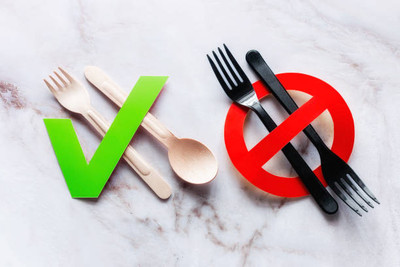What to know about the plastic ban 2023
Posted by The Wares Team on 7th Sep 2023
Fans of the eco friendly lifestyle (basically all of our customers at Wares!) will be delighted to know that all single-use plastics will be banned from 1st October. In this blog, we'll look at what this means and what alternatives are available to support an earth friendly, plastic free lifestyle.
What is happening on 1st October 2023?
From this date, a range of single use plastic products will be banned under law, after a government consultation aimed at reducing pollution. The ban will extend to include all types of single use plates and tableware, bowls, trays, balloon sticks, cutlery, food containers and some types of polystyrene cups. The October date has been selected to give businesses time to adjust and prepare for the new legislation.
What will it mean for customers?
People will no longer be able to buy single-use plastics from any type of business, including retailers, food vendors, takeaways, restaurants and the hospitality industry as a whole. The government consulted widely on this new legislation and found that 95% of the general public supported it.
Why are single-use plastics being banned?
Research suggests that 2.7 billion pieces of single-use cutlery are used every year, as well as 720 million plastic plates. But of this huge figure, just 10 per cent is recycled. If these plastic cutlery items were placed in a line, they'd span the globe more than 8.5 times. Instead, they are heading into landfill and contributing to pollution. This is a major issue because plastic takes hundreds of years to fully degrade and results in significant damage to land, rivers and oceans. It's also a key driver of greenhouse emissions because of the way plastic is made and the way it is disposed of.
Where can I find out more about the ban?
You can find out more about the single-use plastics ban at the government website here: https://www.gov.uk/guidance/single-use-plastics-ban-plates-bowls-trays-containers-cutlery-and-balloon-sticks
What will the benefit of the single-use plastics ban be?
There should be a significant reduction in the manufacture and use of these products, as demand will disappear. Similar moves to ban microbeads, limit the use of plastic straws and cotton buds and the addition of carrier bag charges have helped to slash sales of these plastics by 97% in supermarkets.
Is this the last type of plastic ban in the pipeline?
Potentially not! Eco friendly consumers will be pleased to know that the government is also assessing whether similar types of measures and legislation should be implemented to control the manufacture and use of wet wipes and tobacco products. They are currently in the process of gathering evidence on the scale of pollution and waste derived from these plastic products.
What eco-friendly alternatives can I use?
Many of our customers already use compostable packaging and biodegradable products for food transport and storage. For example, these compostable takeaway products are some of our top-selling lines, and they work perfectly for businesses and domestic users alike/
Our Vegware range is excellent because it's made from biodegradable kraft paper and includes paper bags, sandwich boxes and other types of food carriers - all made to food retail standards.
Compostable takeaway products are fantastic because they simply go into your compost bin after they've been used, and their biodegradable cardboard material naturally turns into compost over time, allowing you to feed your packaging back into your garden for a bumper crop of fruit and veg next year!
Other ways to be eco friendly at home
To fast track to a more sustainable lifestyle, it's easy to start using glass bottles and glass jars rather than single use plastics. Here are some other ideas for creating an eco friendly home:
1. Instead of buying wet wipes, fill a glass jar with paper towels and a cleaning solution to make your own. The added bonus is you get to control what you add to the cleaning solution, such as essential oils. The approach also works for disinfectant wipes, beauty wipes and home cleaning wipes using the same principle and the same glass jars. Here's a guide to get you started: https://www.thespruce.com/homemade-disinfectant-wipes-4801954
2. Use a glass bottle to store your own homemade cordials rather than buying plastic bottled shop cordials. Cordials basically combine water, sugar, fruit and citric acid, so you can make your own with fruits from the garden or the hedgerow. Find inspiration here: https://www.bbcgoodfood.com/howto/guide/how-make-cordial
3. Use glass jars to make overnight oats and meal-prep salads. Just put your salad dressing in the base of your glass jar as the first ingredient before layering your veggies above it. When you're ready to enjoy your salad, simply make sure the lid is screwed on, tip the glass jar upside down and shake it to disperse the salad dressing.
4. Rather than buying mineral wax candles that can pollute your interior ecosystem, use mini glass jars and soy wax to make your own. You only need tapers, wax discs and essential oils to start your own project, and there are plenty of ready-made kits available too.

